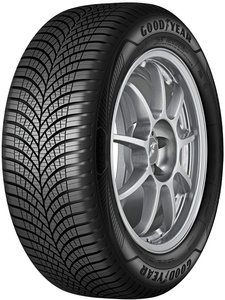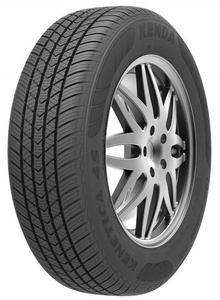All-season tires have long been considered a compromise between summer and winter tires, as they could never quite match the performance of specialized seasonal options. The reason is clear: summer and winter tires are designed for vastly different conditions and have distinct construction features. Summer tires, with their harder rubber compounds and large tread blocks, provide reliable grip even at high temperatures but struggle on snow.
In contrast, winter tires, with their softer compounds and fine sipes, excel in snow and ice but become too soft in warm conditions. Expecting a single tire to perform perfectly in both extremes has always been challenging. However, the market for all-season tires is evolving. Growing customer demand has not only expanded the range of options but also seemingly improved their quality. This progress was highlighted when an all-season tire was tested by ADAC and, for the first time, received a "good" rating, signaling a significant advancement in the performance and reliability of these tires.

Sixteen tires were tested under summer, winter, and wet conditions across various testing grounds. The tested tires have a speed rating of V (240 km/h) and a load index of 94 (670 kg), which align with the typical requirements for many modern cars.
The roster for this test included:
- Falken / EuroAll Season AS210
- Firestone / MultiSeason Gen 02
- Goodyear / Vector 4Seasons Gen-3
- Hankook / Kinergy 4S 2 H750
- Infinity / EcoFour
- Kenda / Kenetica 4S KR202
- Kumho / Solus 4S HA32+
- Michelin / CrossClimate 2
- Nankang / AW-6
- Pirelli / Cinturato All Season SF 2
- Sava / All Weather
- Semperit / AllSeason-Grip
- Toyo / Celsius AS2
- Uniroyal / AllSeasonExpert 2
- Vredestein / Quatrac
- Yokohama / BluEarth 4S AW21
Dry

Dry Braking
- Michelin
- Pirelli
- Vredestein
- Hankook
- Toyo
- Goodyear
- Kumho
- Falken
- Firestone
- Nankang
- Kenda
- Infinity
- Sava
- Semperit
- Yokohama
- Uniroyal
Info! Dry braking in meters, (100-0 km/h).
Wet

The Pirelli Cinturato All Season SF2 excelled in wet braking tests, halting in just 33.3 meters from 80 km/h, leading the pack in wet performance. In comparison, the Infinity Ecofour lagged significantly, needing much more distance to stop. The difference was even more pronounced on wet concrete, where the Pirelli maintained its superior performance, while the Infinity continued to struggle.
Wet Braking
- Pirelli
- Firestone
- Falken
- Goodyear
- Michelin
- Uniroyal
- Vredestein
- Kumho
- Semperit
- Hankook
- Yokohama
- Toyo
- Kenda
- Nankang
- Sava
- Infinity
Info! Wet braking in meters, (80-0 km/h).
Wet Braking - Concrete
- Pirelli
- Falken
- Firestone
- Goodyear
- Vredestein
- Semperit
- Kumho
- Uniroyal
- Michelin
- Yokohama
- Hankook
- Toyo
- Kenda
- Nankang
- Sava
- Infinity
Info! Wet braking on concrete in meters, (80-0 km/h).
Hydroplaning resistance also varied, with the Uniroyal AllSeasonExpert 2 showcasing strong performance in deep water, especially in straight-line scenarios. In contrast, the Infinity Ecofour's limitations were evident, particularly during curved hydroplaning tests, highlighting its challenges in wet conditions.
Straight Hydroplaning
- Uniroyal
- Michelin
- Pirelli
- Falken
- Goodyear
- Vredestein
- Kenda
- Toyo
- Semperit
- Firestone
- Hankook
- Yokohama
- Sava
- Kumho
- Nankang
- Infinity
Info! Float speed, (km/h).
Lateral Hydroplaning
- Uniroyal
- Goodyear
- Falken
- Kenda
- Toyo
- Hankook
- Pirelli
- Vredestein
- Michelin
- Sava
- Semperit
- Firestone
- Yokohama
- Kumho
- Nankang
- Infinity
Info! Remaining lateral acceleration, (m/s²).
Ice and Snow

In snow braking tests, the Semperit AllSeason Grip led the field, stopping in just 10 meters. The Pirelli Cinturato All Season SF2, while strong in wet conditions, required a longer distance to halt on snow-covered roads. When it came to traction on snow, the Sava All Weather outperformed others, generating the highest pulling force, while the Kenda Kenetica 4S struggled with significantly reduced traction.
Snow Braking
- Semperit
- Sava
- Yokohama
- Kumho
- Goodyear
- Uniroyal
- Nankang
- Michelin
- Hankook
- Infinity
- Firestone
- Falken
- Vredestein
- Toyo
- Kenda
- Pirelli
Info! Snow braking in meters (30-0 km/h).
Snow Traction
- Sava
- Semperit
- Michelin
- Kumho
- Goodyear
- Uniroyal
- Vredestein
- Hankook
- Nankang
- Yokohama
- Infinity
- Firestone
- Pirelli
- Falken
- Toyo
- Kenda
Info! Pulling force in neutons.
On icy surfaces, the Pirelli Cinturato All Season SF2 regained its edge, delivering the shortest stopping distance, whereas the Kenda Kenetica 4S once again fell behind, highlighting its challenges in cold weather conditions.
Ice Braking
- Pirelli
- Semperit
- Uniroyal
- Goodyear
- Nankang
- Sava
- Firestone
- Kumho
- Infinity
- Michelin
- Vredestein
- Falken
- Hankook
- Toyo
- Yokohama
- Kenda
Info! Ice braking in meters.
Comfort and Noise
Comfort levels, especially regarding noise reduction, showed considerable variation among the tested models. The Goodyear Vector 4Seasons Gen 3, Pirelli Cinturato All Season SF2, and Nankang Cross Seasons AW6 stood out as the quietest options, offering a notably quieter and more comfortable driving experience. On the other hand, the Falken EUROALL SEASON AS210 was the loudest, which could be a disadvantage for drivers prioritizing noise reduction. In terms of tire weight, most models clustered around a similar range, with the Goodyear, Pirelli, and Nankang tires all weighing in at 70.6 kilograms per set. Meanwhile, when it came to mileage, the Goodyear Vector 4Seasons Gen 3 again outperformed others, with a projected lifespan of 60,700 kilometers. In contrast, the Pirelli Cinturato All Season SF2 offered a much shorter mileage at 33,000 kilometers, indicating a trade-off between performance and longevity.
Tire Weight
- Goodyear
- Pirelli
- Nankang
- Michelin
- Vredestein
- Semperit
- Sava
- Uniroyal
- Infinity
- Firestone
- Toyo
- Kenda
- Kumho
- Hankook
- Yokohama
- Falken
Info! Tire weight per set, (kilograms).
Mileage
- Goodyear
- Hankook
- Kumho
- Toyo
- Uniroyal
- Vredestein
- Infinity
- Michelin
- Kenda
- Sava
- Nankang
- Falken
- Semperit
- Firestone
- Yokohama
- Pirelli
Info! Mileage, in kiometers.
Durability and Efficiency
Durability tests indicated that the Goodyear Vector 4Seasons Gen 3 stands out with impressive longevity, offering a projected lifespan of over 60,000 kilometers. In contrast, the Pirelli Cinturato All Season SF2 fell short in this area, with a significantly lower expected lifespan. Fuel efficiency tests highlighted the Sava All Weather, Vredestein Quatrac, and Infinity Ecofour as the most economical, each consuming 5.2 liters per 100 kilometers. On the other end, the Kenda Kenetica 4S and Yokohama BluEarth 4S AW21 were less efficient, requiring 5.5 liters per 100 kilometers. Abrasion testing revealed the Michelin tire had the least wear, losing just 52 mg/km/t, while the Yokohama tire showed the highest wear, losing 92 mg/km/t, underscoring the varying durability among these models.
Fuel Efficiency
- Sava
- Vredestein
- Infinity
- Michelin
- Nankang
- Firestone
- Uniroyal
- Semperit
- Kumho
- Pirelli
- Goodyear
- Falken
- Hankook
- Toyo
- Kenda
- Yokohama
Info! Fuel efficiency, in litres (per 100km).
Abrasion
- Michelin
- Infinity
- Hankook
- Goodyear
- Kenda
- Toyo
- Vredestein
- Sava
- Kumho
- Uniroyal
- Pirelli
- Falken
- Nankang
- Firestone
- Semperit
- Yokohama
Info! Weight of tire wear, particles lost (mg/km/t).
Overall Verdict
All-season tires are still far from being universal performers. While there have been positive developments, such as seven models receiving recommendations and, notably, the first all-season tire earning a "good" rating, the fact remains that nine out of the 16 tested tires are not recommended. When choosing tires, it's crucial to understand that there are significant differences in performance, both in terms of driving safety and environmental impact. The key focus when purchasing tires should always be performance, not just price. Ideally, the test results should be interpreted in line with your own driving profile. If you rely heavily on your vehicle and cover a substantial number of kilometers each year, selecting a tire that excels in both safety and environmental performance is essential.

Info!
The ADAC test, focused on driving safety, which accounted for 70% of the total score, while environmental impact accounted for the remaining 30%. Ranking of grades: Very good 0.6 - 1.5, Good 1.6 - 2.5, Satisfactory 2.6 - 3.5, Sufficient 3.6 - 4.5, Inadequate 4.6 - 5.5.Results
1st Place: Goodyear / Vector 4Seasons Gen-3 - Rated 2.4
![]() Quick Take
Quick Take
Goodyear Vector 4Seasons Gen-3

The Goodyear Vector 4Seasons Gen-3 stands out in the ADAC 205/55 R16 All-Season Tire Test, achieving strong results in various conditions. On dry roads, it shows slight weaknesses in steering precision, requiring occasional corrective actions, but still maintains good braking performance. In wet conditions, it scores well in braking and hydroplaning tests but could improve in handling precision. The tire excels in winter, offering short braking distances, strong traction on snow, and precise handling. Although it ranks well in most areas, its response to steering could be sharper. The tire is also noted for its good environmental balance, with high mileage, low abrasion, and efficient fuel consumption.
2nd Place: Pirelli / Cinturato All Season SF 2 - Rated 2.6
![]() Quick Take
Quick Take
Pirelli Cinturato All Season SF 2

The Pirelli Cinturato All Season SF2 earning high marks for its performance in driving safety. It delivers safe and precise handling across dry, wet, and winter roads. On dry roads, it offers excellent steering feedback and good reserves at the limit, with above-average braking performance from 100 km/h. In wet conditions, it achieves top marks in braking, handling, and hydroplaning, providing precise and safe driving. On winter roads, it is the only tire in the test to receive a good rating, though it performs slightly below average in snow braking and traction. However, it compensates with good handling and ice braking.
3rd Place: Hankook / Kinergy 4S 2 H750 - Rated 2.7
![]() Quick Take
Quick Take
Hankook Kinergy 4S 2 H750

The Hankook Kinergy 4S² receives a satisfactory rating in the ADAC 205/55 R16 All-Season Tire Test, primarily due to its performance on wet and wintry roads. On dry roads, it offers good steering feedback, precision, and stability, particularly after evasive maneuvers, with braking distances also rated as good. However, in wet conditions, it falls short of achieving a good result. While its hydroplaning behavior is rated well, its braking performance is only satisfactory, and handling is deemed adequate, with early understeer or oversteer.
4th Place: Michelin / CrossClimate 2 - Rated 2.7
![]() Quick Take
Quick Take
Michelin CrossClimate 2

On dry roads, it offers excellent steering feedback, precision, and strong safety reserves, and it delivers the shortest braking distance in the test. However, its performance on wet roads is less impressive. Despite good results in braking and hydroplaning, its handling is rated as sufficient, with the tire showing early tendencies to understeer or oversteer, leading to imprecise steering.
5th Place: Kumho / Solus 4S HA32+ - Rated 2.8
![]() Quick Take
Quick Take
Kumho Solus 4S HA32+

The Kumho Solus 4S HA32+ shows mixed performance across different road conditions. On dry roads, it shows its weakest performance, offering only average steering feedback and lacking precision, which requires occasional corrections during turning and cornering. Its stability during dynamic evasive maneuvers is also less than ideal, and its braking distance is slightly below average, contributing to its satisfactory rating.
6th Place: Vredestein / Quatrac - Rated 2.8
![]() Quick Take
Quick Take
Vredestein Quatrac

The Vredestein Quatrac shows moderate performance across dry, wet, and winter roads. On dry roads, the tire offers only average steering feedback and lacks precision, necessitating occasional corrections during turns and corners. Stability during dynamic evasive maneuvers could be improved. However, it compensates with a slightly above-average braking distance, earning a good rating in this area.
7th Place: Falken / EuroAll Season AS210 - Rated 3.1
![]() Quick Take
Quick Take
Falken EuroAll Season AS210

On dry roads, it offers satisfactory steering feedback, though its performance at the limit just misses a good grade, with braking distances rated as average. On wet roads, the Falken performs well, securing good marks in braking, hydroplaning, and handling. The tire provides good safety reserves, allowing the test car to be driven with precision and stability.
8th Place: Firestone / MultiSeason Gen 02 - Rated 3.6
![]() Quick Take
Quick Take
Firestone MultiSeason Gen 02

The tire responds slowly to steering inputs, requiring the driver to make corrections during turning and cornering. During dynamic maneuvers, the vehicle tends to oversteer early, further limiting its performance. Its braking distance is rated as satisfactory.
9th Place: Sava / All Weather - Rated 3.7
![]() Quick Take
Quick Take
Sava All Weather

The Sava All Weather earns an overall adequate rating in the ADAC 205/55 R16 All-Season Tire Test, with mixed performance across different conditions. On dry roads, it shows notable weaknesses, offering only adequate steering feedback and lacking precision. The tire responds slowly to steering inputs, requiring the driver to make corrections during turns and corners. During dynamic maneuvers, the vehicle tends to oversteer early, leading to only an adequate rating for behavior at the limit. Its braking distance is satisfactory.
10th Place: Nankang / AW-6 - Rated 3.7
![]() Quick Take
Quick Take
Nankang AW-6

The tire provides only sufficient steering feedback and lacks precision, requiring frequent corrections during turns as it responds slowly to steering inputs. During dynamic maneuvers, the vehicle tends to oversteer early, leading to an adequate rating in terms of behavior at the limit. Its braking distance is rated as satisfactory.
11th Place: Toyo / Celsius AS2 - Rated 3.8
![]() Quick Take
Quick Take
Toyo Celsius AS2

The Toyo Celsius AS2 finished with notable weaknesses on dry roads, especially at high temperatures. The tire provides just sufficient steering feedback but lacks precision, requiring the driver to make corrections during both steering and cornering. The tire responds slowly to steering inputs, causing the vehicle to deviate from a consistent radius in curves. Additionally, during dynamic maneuvers or lane changes, the vehicle tends to oversteer early, leading to an adequate rating for its behavior at the limit. The braking distance is rated as satisfactory.
12th Place: Toyo / Celsius AS2 - Rated 3.9
![]() Quick Take
Quick Take
Toyo Celsius AS2

The tire provides only sufficient steering feedback and lacks precision, requiring the driver to make corrections during both steering and cornering. The tire's delayed response to steering inputs results in the vehicle not following a consistent radius in curves. Additionally, during dynamic maneuvers or lane changes, the vehicle tends to oversteer early, leading to an adequate rating for its behavior at the limit. The braking distance is rated as satisfactory.
13th Place: Uniroyal / AllSeasonExpert 2 - Rated 4.0
![]() Quick Take
Quick Take
Uniroyal AllSeasonExpert 2

The tire offers only sufficient steering feedback and lacks precision, requiring the driver to make frequent corrections during steering and cornering. The tire responds slowly to steering inputs, causing the vehicle to deviate from a consistent radius in curves. During dynamic maneuvers or lane changes, the vehicle tends to oversteer early, leading to an adequate rating for its behavior at the limit. The braking distance is rated as satisfactory.>
14th Place: Yokohama / BluEarth 4S AW21 - Rated 4.0
![]() Quick Take
Quick Take
Yokohama BluEarth 4S AW21

The Yokohama BluEarth-4S has notable weaknesses on dry roads, particularly at high temperatures. The tire provides only just sufficient steering feedback and lacks precision, requiring the driver to make corrections during both steering and cornering. The tire's delayed response to steering inputs leads to inconsistent handling in curves, and the vehicle tends to oversteer early during dynamic maneuvers or lane changes, resulting in an adequate rating for its behavior at the limit. The braking distance is rated as satisfactory.
15th Place: Kenda / Kenetica 4S KR202 - Rated 5.1
![]() Quick Take
Quick Take
Kenda Kenetica 4S KR202

The Kenda Kenetica 4S receives an overall poor rating in the ADAC 205/55 R16 All-Season Tire Test, particularly due to its significant weaknesses on winter roads, while also failing to achieve good ratings on dry and wet surfaces. On dry roads, the tire offers decent steering feedback, allowing the vehicle to be steered with acceptable precision and maintaining good behavior at the limit. However, its braking distance is only rated as satisfactory, which prevents it from securing a good overall rating on dry roads.
16th Place: Infinity / EcoFour - Rated 5.4
![]() Quick Take
Quick Take
Infinity EcoFour

The driver must constantly correct the vehicle’s trajectory during steering and cornering, as the tire responds sluggishly to steering inputs, leading to inconsistent handling. The vehicle tends to oversteer early during dynamic maneuvers or lane changes, and the tire’s behavior at the limit is rated as adequate. The braking distance is rated as satisfactory.









